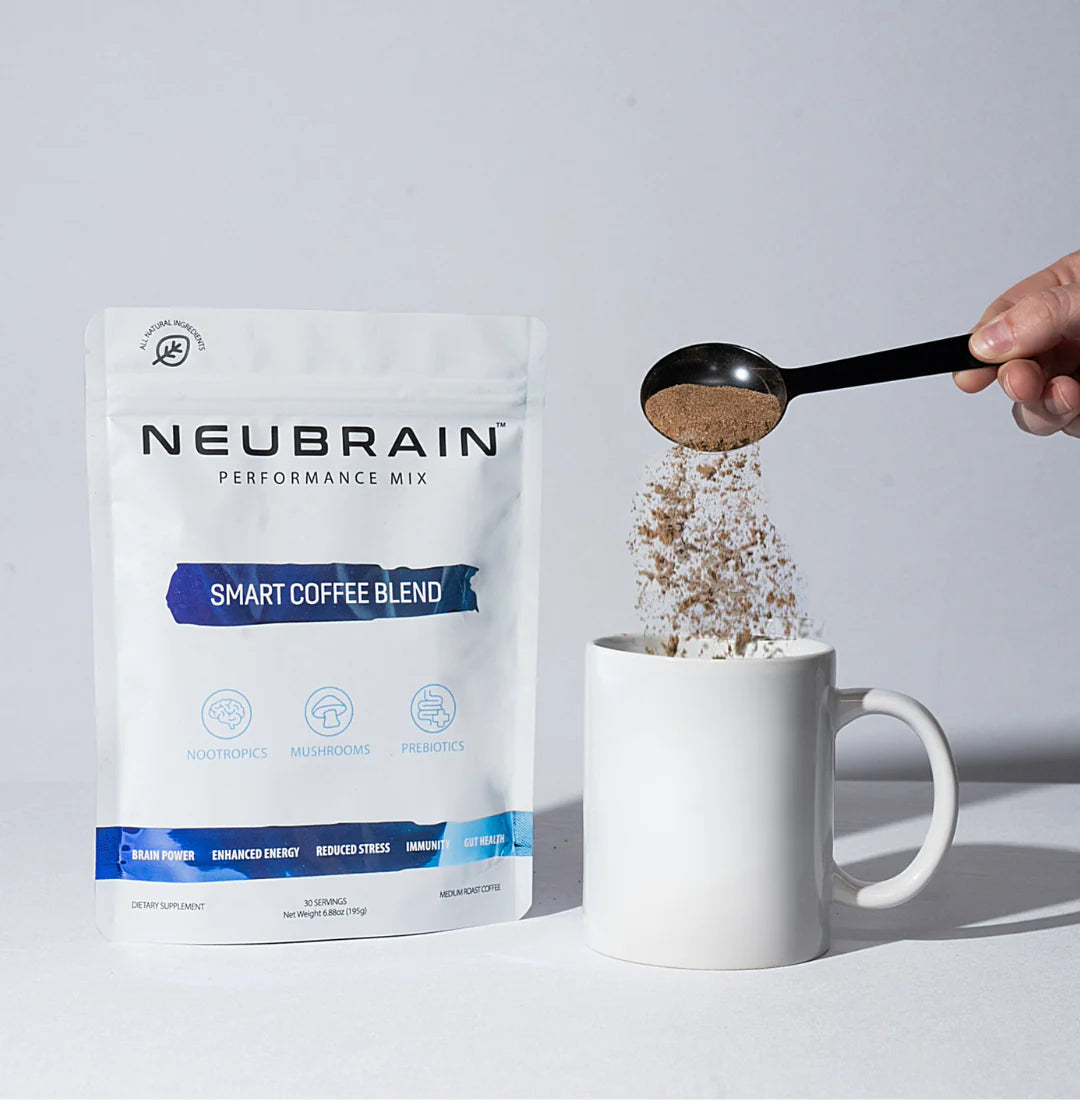Coffee is more than just a morning ritual; it’s a potent beverage that can positively impact your health, particularly your immune system. Studies have shown that the antioxidants and bioactive compounds in coffee can help support immune function. These compounds can reduce inflammation and fight off harmful pathogens, making your daily cup of coffee a potential ally in maintaining your overall health and well-being.
With the constant exposure to various viruses and bacteria, our immune systems are constantly being put to the test. Stress, poor diet, and lack of sleep can weaken our defenses, making it crucial to find natural ways to support and strengthen our immune response. This is where functional foods and beverages, like coffee, come into play, offering simple yet effective solutions to support our health.
In this blog post, we’ll explore the connection between coffee and the immune system, exploring how this beloved beverage can support your body’s natural defenses.
7 Ways Coffee Benefits Our Immune System
1. Protection Against Autoimmune Diseases
Kahweol, Cafestol, and Arabinogalactans allow coffee to contribute to cytotoxicity and natural killer cells by acting on C-reactive proteins and toll-like receptors. Coffee enhances the activity of natural killer cells, prevents degeneration, and protects the coffee consumer against various autoimmune diseases.
Compared to a typical immune system, a caffeine-filled system potentially suppresses the proliferation of Th1 and Th2 cells, significantly reducing the damage done by releasing cytokines due to overactive T and B cells.
Coffee consumption has a mixed effect on many autoimmune diseases. It increases the risk of developing rheumatoid arthritis and Type 1 diabetes mellitus. On the contrary, coffee consumption proactively prevents multiple sclerosis, primary sclerosing cholangitis, and ulcerative colitis. However, it has shown no significant association with many autoimmune diseases, including systematic lupus erythematosus, psoriasis, Crohn’s disease, and primary biliary cholangitis.
2. Immuno-Modulator
Caffeine appears to have an anti-inflammatory effect in some situations. It calms the overactive immune system. The effects are pretty clearly visible in animal models, and it is clear that they can affect many different types of inflammation. With caffeine having an impact on multiple parts of the immune system, particularly lymphocytes, the effects appear quite similar in humans, too.
There is good evidence to suggest a suppressive effect of caffeine on lymphocytes. Coffee modulates the immune cells that have become too active. Moreover, other immune cells, such as natural killer and macrophages, exhibit reduced activity during high caffeine doses.
Coffee acts truly immunosuppressive in many situations, given the reduced anti-inflammatory cytokines such as TNF-α, IL-2, and IL-6. Certain immune receptors, such as TLR1, TLR2, TLR4, and the NHC class, also showed lower decreased activity due to coffee consumption.
It has an impact on many parts of our immune system, which makes it an excellent immunomodulator.
3. Reduce Cancer Risks
Recent studies have found that coffee can lower the risk of several types of fatal cancer, including colorectal, head and neck, breast, and liver cancer. More studies are being conducted to understand the potential beneficial effects of coffee. But roasted coffee contains hundreds of biological compounds, including caffeine, flavonoids, lignans, and other polyphenols.
The secret to reducing cancer risk is not to become addicted. Drink a reasonable amount, 2 to 3 cups a day, to protect your body from deadly diseases.
Coffee compounds have been shown to increase energy consumption, regulate genes involved in DNA repair, inhibit cellular damage, have anti-inflammatory properties, inhibit metastasis, and perform many other activities.
A surprising effect of coffee consumption is a lower risk of insulin resistance and type-2 diabetes. It is excellent because diabetes increases the risk of colorectal, liver, breast, and endometrial cancer.
4. Contains Antioxidants
Free radicals are unstable molecules that constantly attack the body, causing significant harm to essential molecules such as DNA and proteins. This ongoing damage can lead to oxidative stress, which is linked to aging and a variety of diseases.
Coffee, fortunately, is rich in powerful antioxidants like polyphenols and hydrocinnamic acids, which play a crucial role in improving health and reducing the risk of several serious illnesses.
Also Read: The Top 5 Benefits of Chaga Mushrooms
Coffee contains abundant hydrocinnamic acids, which help neutralize free radicals and protect the body from the detrimental effects of oxidative stress.
These antioxidants contribute to overall health and longevity by safeguarding cells from damage. Polyphenols, another key component of coffee, have been shown to prevent many deadly diseases, including heart conditions, cancer, and type 2 diabetes.
Research published in the Journal of Frontiers in Nutrition indicates that regular consumption of polyphenol-rich foods and beverages, like coffee, can significantly reduce the risk of chronic diseases due to their anti-inflammatory and antioxidant properties.
So, coffee is not only a way of enjoying a delicious beverage but also fortifying your body against the onslaught of free radicals and the associated health risks. The antioxidants in coffee offer a protective shield, promoting long-term health and resilience against various diseases.
5. Probiotic Delivery
Probiotics are living microorganisms that provide substantial health benefits when consumed in adequate amounts, primarily enhancing immune and gut functions. While dairy products are a common dietary source of probiotics, coffee brews can also serve as an effective delivery system.
Non-fermented probiotic coffee maintains the viability of probiotics even against high temperatures, offering a convenient way to boost your intake of these beneficial microorganisms.
The health benefits of probiotics in coffee are significantly amplified when using fermented probiotic coffee. Fermentation increases the bioavailability of various endogenous coffee components, such as melanoidins and phenolic compounds, which are crucial for overall health.
According to a study published in the Journal of Nutrients, fermented coffee enhances the stability and efficacy of probiotics, thereby improving gut health and supporting the immune system more effectively.
The combination of probiotics and coffee's natural compounds provides a synergistic effect, enhancing your body's ability to fend off illnesses and maintain optimal health.
6. Protect Your Liver
The liver is a vital organ that plays a key role in regulating chemicals in the blood and protecting the body from numerous diseases, including cirrhosis, where the liver is replaced by scar tissue. Coffee consumption can be particularly beneficial for liver health due to its caffeine content.
Caffeine metabolizes into a chemical called paraxanthine, which slows the growth of scar tissue, thereby preventing cirrhosis. Additionally, coffee has been shown to reduce the risk of fatty liver disease and hepatitis C.
The protective effects of coffee on the liver extend to enhancing immune function specifically for this organ.
Research indicates that regular coffee consumption significantly lowers the risk of liver-related ailments. According to WebMD, drinking two cups of coffee per day can reduce the odds of developing cirrhosis by 44%, while consuming four cups daily can decrease the risk by 65%. These findings underscore the powerful impact coffee can have on maintaining liver health and preventing severe liver diseases.
Incorporating coffee into your daily routine offers a simple yet effective way to support liver health. The antioxidants and other bioactive compounds in coffee not only aid in liver function but also contribute to the overall immune defense of this crucial organ.
7. Helps Burn Fat
Caffeine, a primary stimulant in coffee, is well-known for its fat-burning properties, which is why many commercial fat-burning supplements include it as a key ingredient. Caffeine works by stimulating the nervous system, leading to the breakdown of fat cells. This process is further enhanced by coffee's ability to increase the levels of epinephrine, or adrenaline, in the blood.
Epinephrine travels through the bloodstream, signaling fat cells to break down and release their contents into the bloodstream for energy use. However, simply releasing fat into the bloodstream isn't enough to reduce fat; it must be burned off through physical activity or by maintaining a calorie deficit, a state known as negative energy balance.
Coffee can be a helpful tool in this process, as it mobilizes fat and boosts metabolic rate. Studies have shown that coffee can increase the resting metabolic rate by 3-11%, making it easier to lose weight. It's important to note that this effect is less pronounced in obese individuals and tends to decrease with age.
So, whether you choose to exercise more or adjust your diet, the metabolic boost from coffee can make your weight loss journey more effective.
FAQs
Can drinking coffee every day improve my immune health?
Moderate coffee consumption can have positive effects on your immune system due to its high antioxidant content and anti-inflammatory properties. However, it's important to maintain coffee, a balanced diet and a healthy lifestyle for optimal immune function.
Are there any negative effects of coffee on the immune system?
While moderate coffee consumption can be beneficial, excessive intake may lead to negative effects such as increased stress and disrupted sleep, which can impair immune function. It's important to consume coffee in moderation.
Does coffee help in fighting infections?
The antioxidants in coffee can support the immune system's ability to fight infections by reducing oxidative stress and inflammation. However, coffee alone is not a cure for infections and should be part of a broader healthy lifestyle.
How much coffee should I drink to boost my immune system?
Studies suggest that drinking 2-4 cups of coffee per day can provide health benefits, including support for the immune system. It's best to consult with a healthcare professional to determine the right amount for your individual health needs.
Can decaffeinated still benefit the immune system?
Yes, decaffeinated coffee retains most of the beneficial antioxidants and compounds found in regular coffee, making it a good option for those who are sensitive to caffeine but still want to support their immune health.
Conclusion
So, coffee offers numerous benefits for the immune system, thanks to its rich antioxidant content, anti-inflammatory properties, and potential as a probiotic delivery vehicle. The addition of coffee into your daily routine can help maintain your body's defenses against illnesses and support overall health.
Whether you prefer a traditional brew or a specialty blend, enjoying coffee in moderation can be a valuable addition to a healthy lifestyle.








